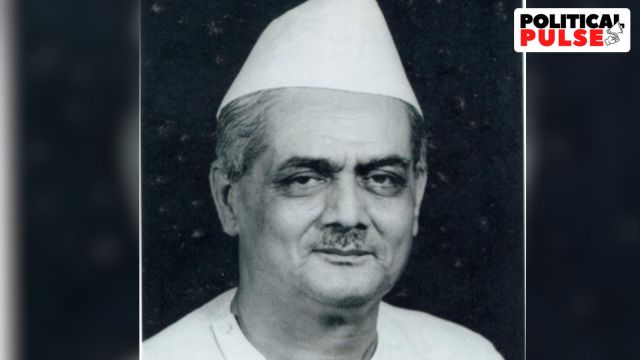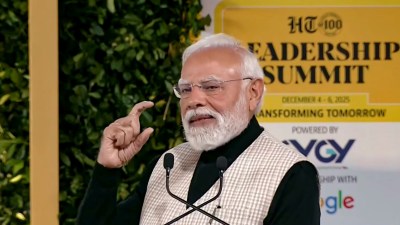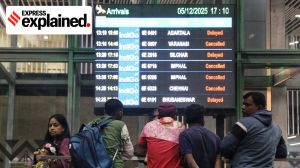The Opposition INDIA bloc submitted a notice Tuesday for bringing a resolution for removal of Vice-President of India Jagdeep Dhankar, who is also the ex-officio Chairperson of the Rajya Sabha, accusing him of being “explicitly partisan” in conducting the proceedings of the House and acting as an “impassioned spokesperson” of the government’s policies at public fora.

The first motion was moved against India’s first Speaker G V Mavalankar on December 18, 1954 by Vigneshwar Missir, Socialist Party MP from Bihar, with Deputy Speaker A Ayyangar in the Chair. The motion was rejected by the House after an acrimonious two-hour debate.
The second motion was moved on November 24, 1966, against the then Speaker Sardar Hukum Singh by socialist leader Madhu Limaye, with Deputy Speaker S V Krishnamoorthy Rao in the Chair. As fewer than 50 members rose to back it, the motion was not taken up.
The third motion was moved on April 15, 1987, for the removal of Speaker Balram Jakhar by CPI (M) MP Somnath Chatterjee, with Deputy Speaker Thambi Durai in the Chair. This motion was also rejected by the House.
As per Article 94 of the Constitution, the Lok Sabha Speaker can be removed by a resolution of the Lok Sabha passed by a majority of the then members of the House. At least 14 days’ notice has to be given of the intention to move such a resolution in writing to the Secretary General. The member who gave the notice moves the resolution on a date assigned after 14 days of the notice.
The Chair — generally the Deputy Speaker, as the Speaker cannot preside over the House when a motion for his removal is taken up — places the motion before the House and asks whether leave be granted to take it up, adding that members who wish that the motion be taken up rise in their seats. If not less than 50 members rise accordingly, the Chair declares that leave is granted for the House to consider the resolution on a particular day. However, the removal of the Speaker takes place on that day only if a majority of the then members vote for his removal — an uphill task given that the government of the day enjoys a majority in the Lok Sabha.
Story continues below this ad
Failed bid to remove Mavalankar
The first move to impeach the presiding officer of a House of Parliament took place as early as 1954, when the Opposition members sought the removal of Lok Sabha Speaker Mavalankar.
On December 18, 1954, the Lok Sabha took up the Opposition’s motion after the Deputy Speaker said that he was admitting it despite it not being properly worded because it pertained to an important matter.
Prime Minister Jawaharlal Nehru requested that given the nature of the motion, the Opposition should be given more time to speak than the Treasury benches. “In this particular case, more time should be allowed to the Opposition than the government benches,” Nehru said.
The resolution, moved by Vigneshwar Missir, alleged that the Speaker was not impartial, that he did not allow members to exercise their rights as MPs, and that he openly supported the government version of issues over the one presented by the Opposition members. So, it added, the House wanted him removed from the Chair.
Story continues below this ad
Participating in the debate, S S More, the MP from Sholapur belonging to the Peasants and Workers Party, accused the Speaker of disallowing adjournment motion notices by the Opposition members on important matters.
“We have till now moved about 89 adjournment motions, and out of them, two were not pressed and only one was allowed… Barring these three, 86 adjournment motions have been disallowed,” More said, seeing this as a sign that the Speaker was not impartial.
Speaking for the motion, A K Gopalan of the CPI said that adjournment motions were not allowed, charging that the Speaker had after his election to the post openly called himself a party man. He also accused the Speaker of being partisan as he accepted the version of the Home Ministry regarding violence and firing in Kurnool when a Communist members’ procession was passing through a lane inhabited by Congress workers, leading to injuries sustained by a Communist MP. He said that when another CPI MP raised the matter in the House, the Speaker sided with the government and disallowed his adjournment motion notice.
Sardar Hukum Singh opposed the resolution, saying that there was not a single instance where the Speaker could be proved to be biased or incompetent, though he was also human and not infallible. He, thus, disagreed with the move to remove Mavalankar. He added that as for the incident of firing in Kurnool, law and order was a state subject and the Speaker was well within his rights to disallow a discussion over it.
Story continues below this ad
N B Khare of the Hindu Mahasabha said that he did not get a chance to ask questions on a number of important issues as he did not get permission for the same from the Speaker. “Here are about two dozen death warrants of my poor dry dead questions,” he exclaimed, drawing words of rebuke from the Deputy Speaker.
Intervening in the debate, Prime Minister Nehru said that there was no whip on any member of the ruling Congress, and they could vote as they wished, as this was a matter concerning the honour of the House. He then expressed anguish over the bona fides of the Speaker being questioned, saying, “When we challenge his bona fides we betray before our countrymen and indeed before the world that we are little men and that is the seriousness of the situation.”
Defending Mavalankar, Nehru debunked the allegation of the Opposition members that he did not allow adjournment motions. Asserting that the House of Commons in Britain saw adjournment motion notices being given once or twice a year, he said the Lok Sabha saw three such notices being given in just a day. “A motion for adjournment is a valued and precious right. But every valued and precious right can be so misused as to become a nuisance, and lose all its value. You debase it if you use it in that way,” Nehru said. He added that while he did not want to use any harsh words about the things said by the Opposition members, he was “amazed at this extraordinary exhibition from the other side”. “It was an exhibition of incompetence, frivolity and lack of substance. It is astounding,” Nehru said.
Regarding the Speaker not accepting questions from the Opposition members, Nehru said there was no dearth of questions in Parliament. “In fact, we cannot deal with all of them. Can you imagine the amount of time and money that is spent on gathering facts for answering twenty or thirty thousand questions? The whole apparatus of the government is functioning like that. Daily telegrams are going all over the country to get facts,” he said.
Story continues below this ad
Regarding the no-confidence resolution against the Speaker signed by Opposition members, the first PM said, “It is a vicious thing they have signed. I doubt whether the persons have read it before they signed it.”
Nehru then targeted the Communist MPs, saying that he did not expect any sense of responsibility from them, “but I do expect, even according to their proclamations elsewhere, that they do not believe in democracy or the democratic set-up”. A K Gopalan hit back at Nehru, saying, “We have come here because democracy is in your pocket and we understood that democracy has to be shared.” Nehru responded, saying “I hope Shri Gopalan will repeat that every morning so that gradually it might have some effect on his thinking and action.”
Nehru said that to ask any member to support the resolution would be to suppose that the member has no intelligence. The motion was then put to vote and rejected.

































